北师大版高中英语模块5 Unit 13 People 语言点2
文档属性
| 名称 | 北师大版高中英语模块5 Unit 13 People 语言点2 | 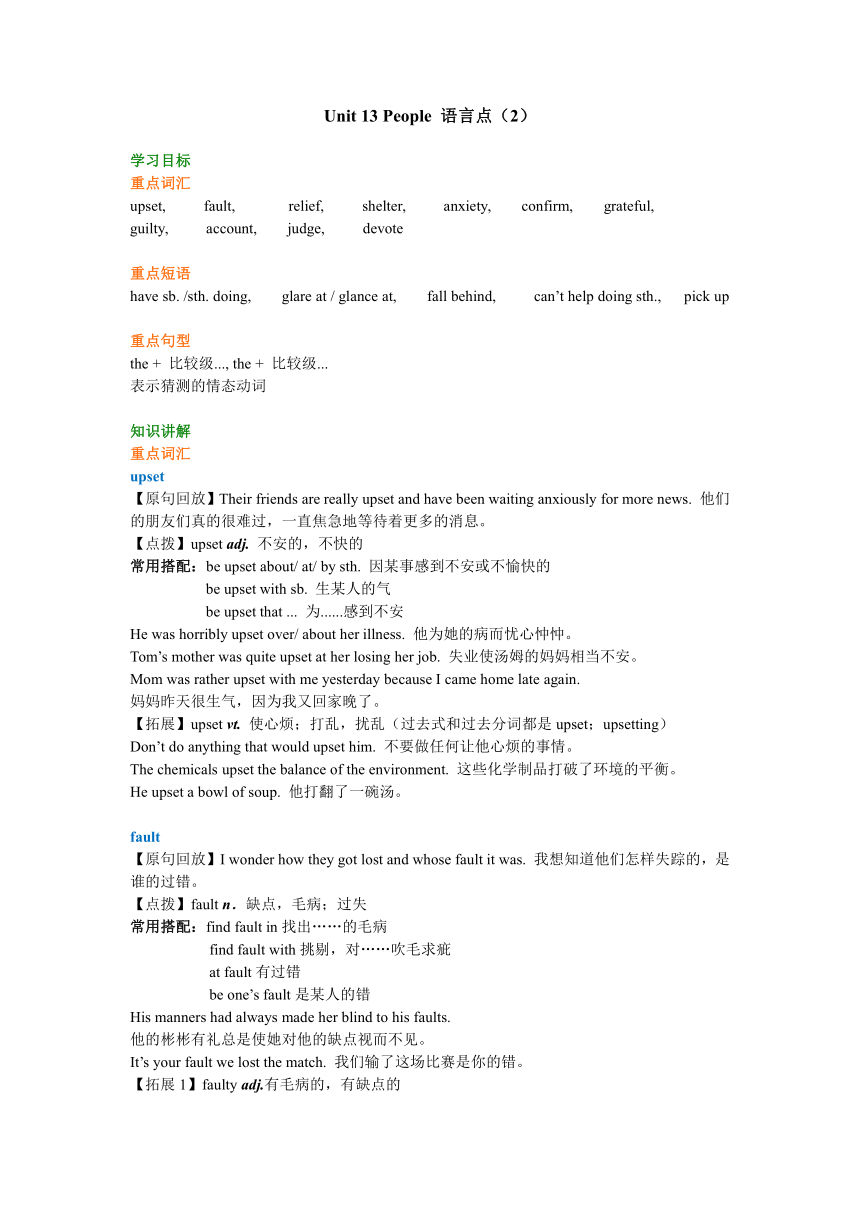 | |
| 格式 | zip | ||
| 文件大小 | 36.0KB | ||
| 资源类型 | 教案 | ||
| 版本资源 | 北师大版 | ||
| 科目 | 英语 | ||
| 更新时间 | 2019-11-12 15:02:45 | ||
图片预览

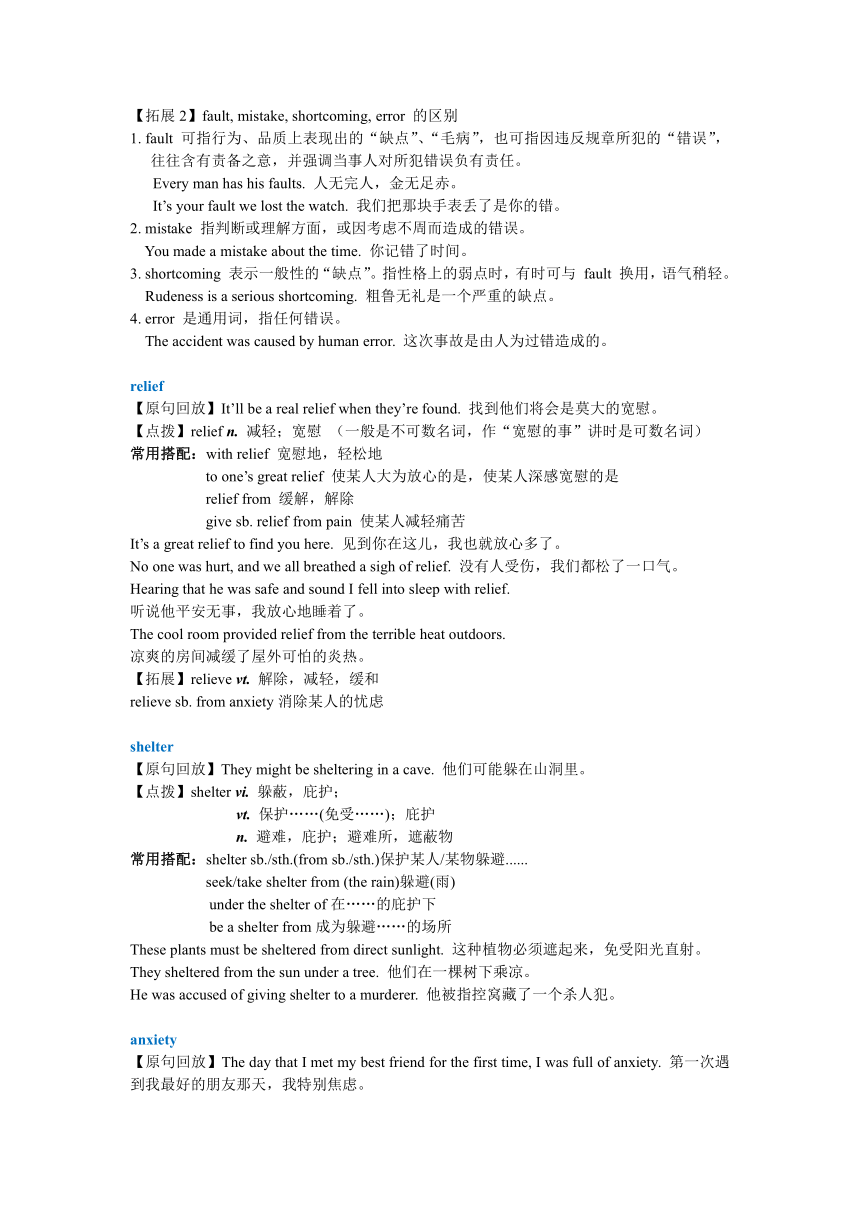
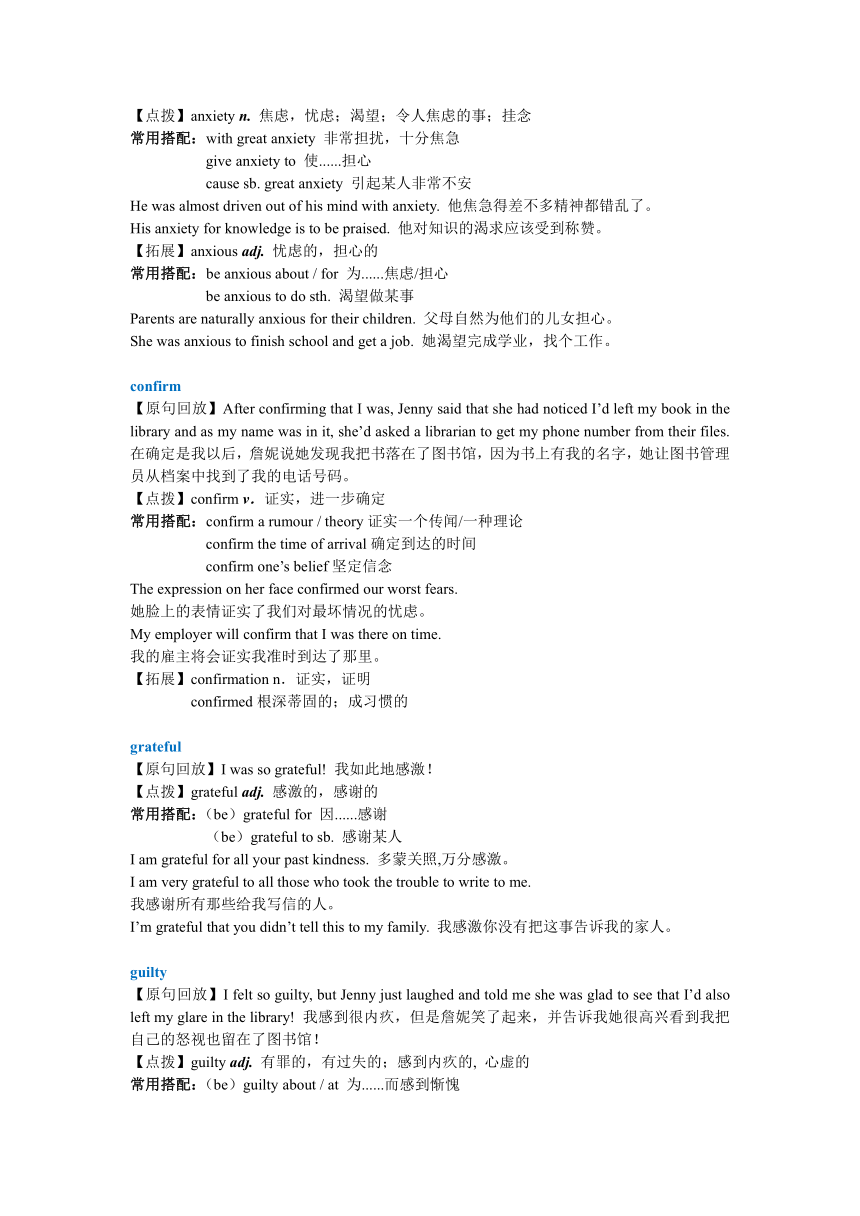
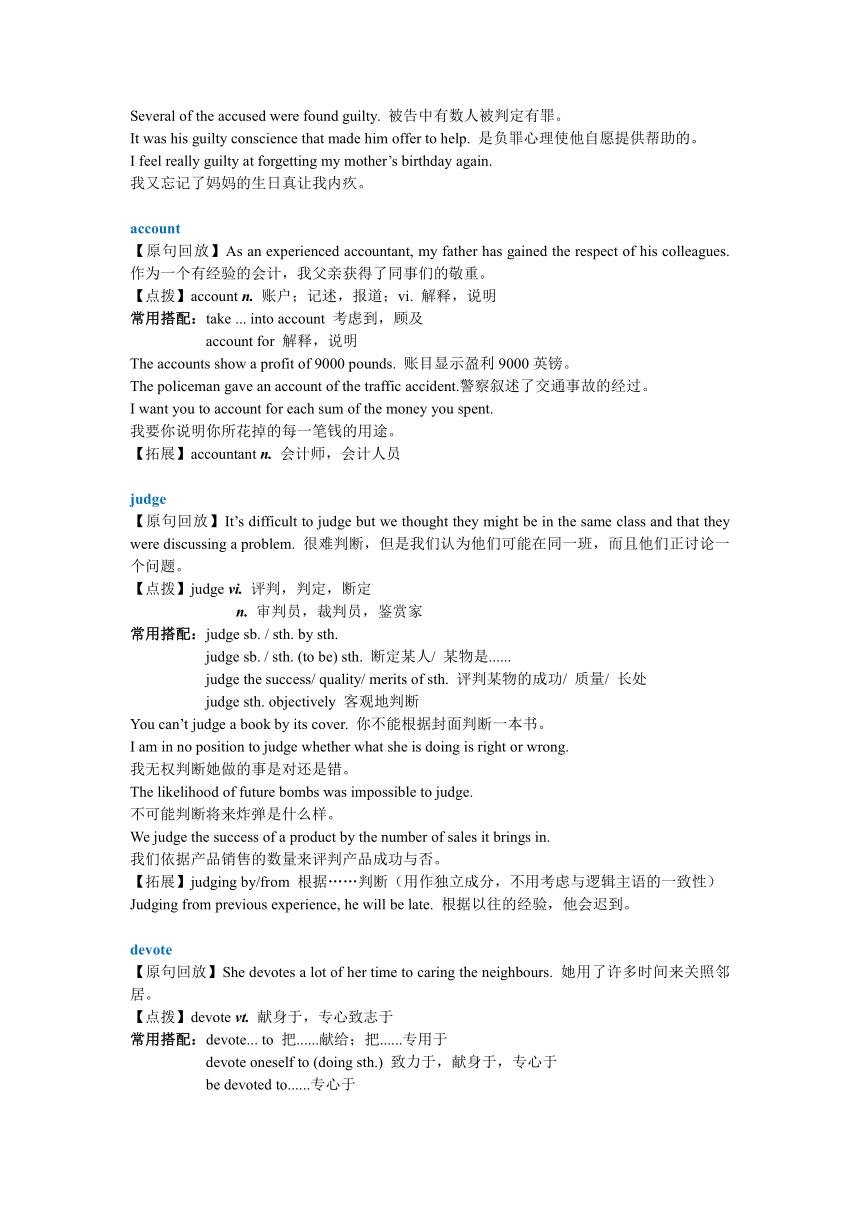
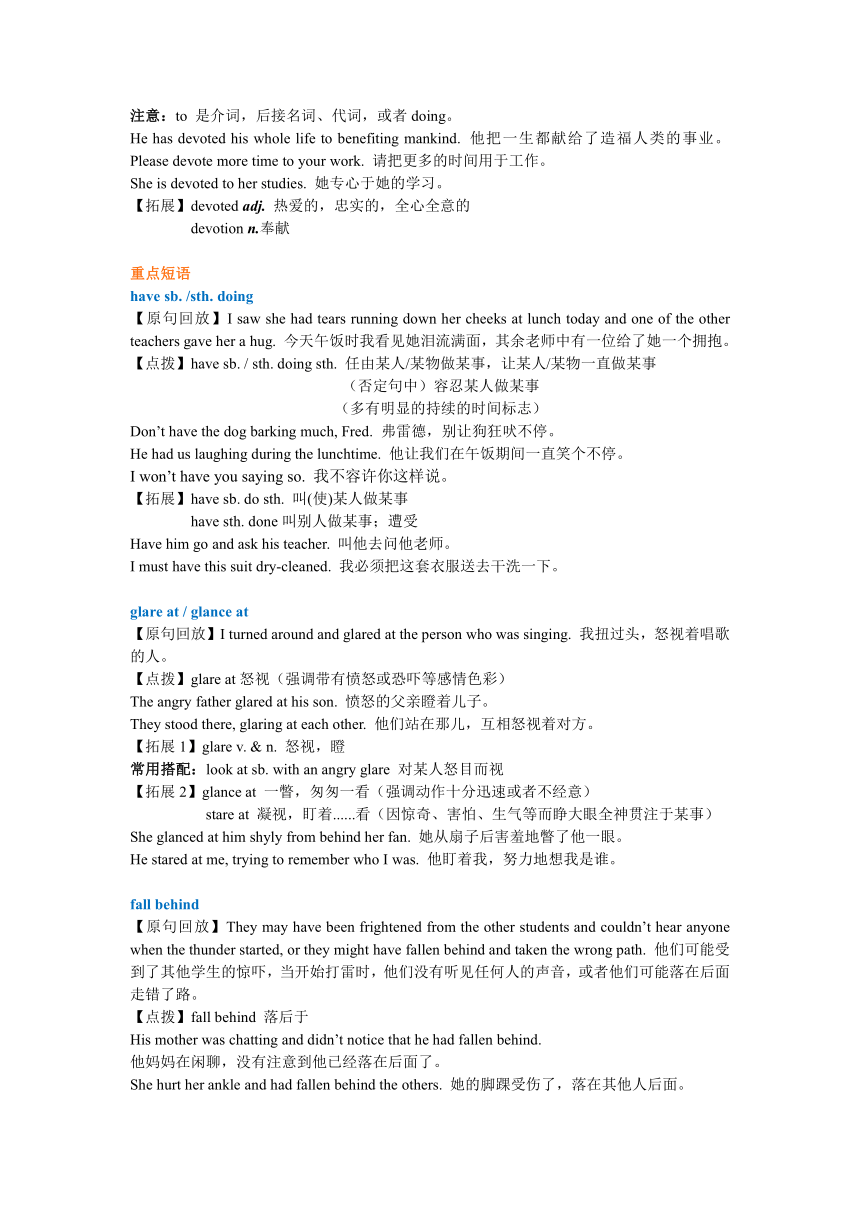
文档简介
Unit 13 People 语言点(2)
学习目标
重点词汇
upset, fault, relief, shelter, anxiety, confirm, grateful,
guilty, account, judge, devote
重点短语
have sb. /sth. doing, glare at / glance at, fall behind, can’t help doing sth., pick up
重点句型
the + 比较级..., the + 比较级...
表示猜测的情态动词
知识讲解
重点词汇
upset
【原句回放】Their friends are really upset and have been waiting anxiously for more news. 他们的朋友们真的很难过,一直焦急地等待着更多的消息。
【点拨】upset adj. 不安的,不快的
常用搭配:be upset about/ at/ by sth. 因某事感到不安或不愉快的
be upset with sb. 生某人的气
be upset that ... 为......感到不安
He was horribly upset over/ about her illness. 他为她的病而忧心忡忡。
Tom’s mother was quite upset at her losing her job. 失业使汤姆的妈妈相当不安。
Mom was rather upset with me yesterday because I came home late again.
妈妈昨天很生气,因为我又回家晚了。
【拓展】upset vt. 使心烦;打乱,扰乱(过去式和过去分词都是upset;upsetting)
Don’t do anything that would upset him. 不要做任何让他心烦的事情。
The chemicals upset the balance of the environment. 这些化学制品打破了环境的平衡。
He upset a bowl of soup. 他打翻了一碗汤。
fault
【原句回放】I wonder how they got lost and whose fault it was. 我想知道他们怎样失踪的,是谁的过错。
【点拨】fault n.缺点,毛病;过失
常用搭配:find fault in找出……的毛病
find fault with挑剔,对……吹毛求疵
at fault有过错
be one’s fault是某人的错
His manners had always made her blind to his faults.
他的彬彬有礼总是使她对他的缺点视而不见。
It’s your fault we lost the match. 我们输了这场比赛是你的错。
【拓展1】faulty adj.有毛病的,有缺点的
【拓展2】fault, mistake, shortcoming, error 的区别
1. fault 可指行为、品质上表现出的“缺点”、“毛病”,也可指因违反规章所犯的“错误”,往往含有责备之意,并强调当事人对所犯错误负有责任。
Every man has his faults. 人无完人,金无足赤。
It’s your fault we lost the watch. 我们把那块手表丢了是你的错。
2. mistake 指判断或理解方面,或因考虑不周而造成的错误。
You made a mistake about the time. 你记错了时间。
3. shortcoming 表示一般性的“缺点”。指性格上的弱点时,有时可与 fault 换用,语气稍轻。
Rudeness is a serious shortcoming. 粗鲁无礼是一个严重的缺点。
4. error 是通用词,指任何错误。
The accident was caused by human error. 这次事故是由人为过错造成的。
relief
【原句回放】It’ll be a real relief when they’re found. 找到他们将会是莫大的宽慰。
【点拨】relief n. 减轻;宽慰 (一般是不可数名词,作“宽慰的事”讲时是可数名词)
常用搭配:with relief 宽慰地,轻松地
to one’s great relief 使某人大为放心的是,使某人深感宽慰的是
relief from 缓解,解除
give sb. relief from pain 使某人减轻痛苦
It’s a great relief to find you here. 见到你在这儿,我也就放心多了。
No one was hurt, and we all breathed a sigh of relief. 没有人受伤,我们都松了一口气。
Hearing that he was safe and sound I fell into sleep with relief.
听说他平安无事,我放心地睡着了。
The cool room provided relief from the terrible heat outdoors.
凉爽的房间减缓了屋外可怕的炎热。
【拓展】relieve vt. 解除,减轻,缓和
relieve sb. from anxiety消除某人的忧虑
shelter
【原句回放】They might be sheltering in a cave. 他们可能躲在山洞里。
【点拨】shelter vi. 躲蔽,庇护;
vt. 保护……(免受……);庇护
n. 避难,庇护;避难所,遮蔽物
常用搭配:shelter sb./sth.(from sb./sth.)保护某人/某物躲避......
seek/take shelter from (the rain)躲避(雨)
under the shelter of在……的庇护下
be a shelter from成为躲避……的场所
These plants must be sheltered from direct sunlight. 这种植物必须遮起来,免受阳光直射。
They sheltered from the sun under a tree. 他们在一棵树下乘凉。
He was accused of giving shelter to a murderer. 他被指控窝藏了一个杀人犯。
anxiety
【原句回放】The day that I met my best friend for the first time, I was full of anxiety. 第一次遇到我最好的朋友那天,我特别焦虑。
【点拨】anxiety n. 焦虑,忧虑;渴望;令人焦虑的事;挂念
常用搭配:with great anxiety 非常担扰,十分焦急
give anxiety to 使......担心
cause sb. great anxiety 引起某人非常不安
He was almost driven out of his mind with anxiety. 他焦急得差不多精神都错乱了。
His anxiety for knowledge is to be praised. 他对知识的渴求应该受到称赞。
【拓展】anxious adj. 忧虑的,担心的
常用搭配:be anxious about / for 为......焦虑/担心
be anxious to do sth. 渴望做某事
Parents are naturally anxious for their children. 父母自然为他们的儿女担心。 She was anxious to finish school and get a job. 她渴望完成学业,找个工作。
confirm
【原句回放】After confirming that I was, Jenny said that she had noticed I’d left my book in the library and as my name was in it, she’d asked a librarian to get my phone number from their files. 在确定是我以后,詹妮说她发现我把书落在了图书馆,因为书上有我的名字,她让图书管理员从档案中找到了我的电话号码。
【点拨】confirm v.证实,进一步确定
常用搭配:confirm a rumour / theory证实一个传闻/一种理论
confirm the time of arrival确定到达的时间
confirm one’s belief坚定信念
The expression on her face confirmed our worst fears.
她脸上的表情证实了我们对最坏情况的忧虑。
My employer will confirm that I was there on time.
我的雇主将会证实我准时到达了那里。
【拓展】confirmation n.证实,证明
confirmed根深蒂固的;成习惯的
grateful
【原句回放】I was so grateful! 我如此地感激!
【点拨】grateful adj. 感激的,感谢的
常用搭配:(be)grateful for 因......感谢
(be)grateful to sb. 感谢某人
I am grateful for all your past kindness. 多蒙关照,万分感激。
I am very grateful to all those who took the trouble to write to me.
我感谢所有那些给我写信的人。
I’m grateful that you didn’t tell this to my family. 我感激你没有把这事告诉我的家人。
guilty
【原句回放】I felt so guilty, but Jenny just laughed and told me she was glad to see that I’d also left my glare in the library! 我感到很内疚,但是詹妮笑了起来,并告诉我她很高兴看到我把自己的怒视也留在了图书馆!
【点拨】guilty adj. 有罪的,有过失的;感到内疚的, 心虚的
常用搭配:(be)guilty about / at 为......而感到惭愧
Several of the accused were found guilty. 被告中有数人被判定有罪。
It was his guilty conscience that made him offer to help. 是负罪心理使他自愿提供帮助的。
I feel really guilty at forgetting my mother’s birthday again.
我又忘记了妈妈的生日真让我内疚。
account
【原句回放】As an experienced accountant, my father has gained the respect of his colleagues. 作为一个有经验的会计,我父亲获得了同事们的敬重。
【点拨】account n. 账户;记述,报道;vi. 解释,说明
常用搭配:take ... into account 考虑到,顾及
account for 解释,说明
The accounts show a profit of 9000 pounds. 账目显示盈利9000英镑。
The policeman gave an account of the traffic accident.警察叙述了交通事故的经过。
I want you to account for each sum of the money you spent.
我要你说明你所花掉的每一笔钱的用途。
【拓展】accountant n. 会计师,会计人员
judge
【原句回放】It’s difficult to judge but we thought they might be in the same class and that they were discussing a problem. 很难判断,但是我们认为他们可能在同一班,而且他们正讨论一个问题。
【点拨】judge vi. 评判,判定,断定
n. 审判员,裁判员,鉴赏家
常用搭配:judge sb. / sth. by sth.
judge sb. / sth. (to be) sth. 断定某人/ 某物是......
judge the success/ quality/ merits of sth. 评判某物的成功/ 质量/ 长处
judge sth. objectively 客观地判断
You can’t judge a book by its cover. 你不能根据封面判断一本书。
I am in no position to judge whether what she is doing is right or wrong.
我无权判断她做的事是对还是错。
The likelihood of future bombs was impossible to judge.
不可能判断将来炸弹是什么样。
We judge the success of a product by the number of sales it brings in.
我们依据产品销售的数量来评判产品成功与否。
【拓展】judging by/from 根据……判断(用作独立成分,不用考虑与逻辑主语的一致性)
Judging from previous experience, he will be late. 根据以往的经验,他会迟到。
devote
【原句回放】She devotes a lot of her time to caring the neighbours. 她用了许多时间来关照邻居。
【点拨】devote vt. 献身于,专心致志于
常用搭配:devote... to 把......献给;把......专用于
devote oneself to (doing sth.) 致力于,献身于,专心于
be devoted to......专心于
注意:to 是介词,后接名词、代词,或者doing。
He has devoted his whole life to benefiting mankind. 他把一生都献给了造福人类的事业。Please devote more time to your work. 请把更多的时间用于工作。
She is devoted to her studies. 她专心于她的学习。
【拓展】devoted adj. 热爱的,忠实的,全心全意的
devotion n.奉献
重点短语
have sb. /sth. doing
【原句回放】I saw she had tears running down her cheeks at lunch today and one of the other teachers gave her a hug. 今天午饭时我看见她泪流满面,其余老师中有一位给了她一个拥抱。
【点拨】have sb. / sth. doing sth. 任由某人/某物做某事,让某人/某物一直做某事
(否定句中)容忍某人做某事
(多有明显的持续的时间标志)
Don’t have the dog barking much, Fred. 弗雷德,别让狗狂吠不停。
He had us laughing during the lunchtime. 他让我们在午饭期间一直笑个不停。
I won’t have you saying so. 我不容许你这样说。
【拓展】have sb. do sth. 叫(使)某人做某事
have sth. done叫别人做某事;遭受
Have him go and ask his teacher. 叫他去问他老师。
I must have this suit dry-cleaned. 我必须把这套衣服送去干洗一下。
glare at / glance at
【原句回放】I turned around and glared at the person who was singing. 我扭过头,怒视着唱歌的人。
【点拨】glare at怒视(强调带有愤怒或恐吓等感彩)
The angry father glared at his son. 愤怒的父亲瞪着儿子。
They stood there, glaring at each other. 他们站在那儿,互相怒视着对方。
【拓展1】glare v. & n. 怒视,瞪
常用搭配:look at sb. with an angry glare 对某人怒目而视
【拓展2】glance at 一瞥,匆匆一看(强调动作十分迅速或者不经意)
stare at 凝视,盯着......看(因惊奇、害怕、生气等而睁大眼全神贯注于某事)
She glanced at him shyly from behind her fan. 她从扇子后害羞地瞥了他一眼。
He stared at me, trying to remember who I was. 他盯着我,努力地想我是谁。
fall behind
【原句回放】They may have been frightened from the other students and couldn’t hear anyone when the thunder started, or they might have fallen behind and taken the wrong path. 他们可能受到了其他学生的惊吓,当开始打雷时,他们没有听见任何人的声音,或者他们可能落在后面走错了路。
【点拨】fall behind 落后于
His mother was chatting and didn’t notice that he had fallen behind.
他妈妈在闲聊,没有注意到他已经落在后面了。
She hurt her ankle and had fallen behind the others. 她的脚踝受伤了,落在其他人后面。
can’t help doing sth.
【原句回放】I couldn’t help laughing at this and I invited her back to my apartment for a quick cup of tea. 听了这话,我禁不住笑了,然后我邀请她去我家喝杯茶。
【点拨】can’t help doing sth. 情不自禁做某事
We couldn’t help laughing when we heard the funny story.
我们听到这个有趣的故事,禁不住大笑起来。
Between astonishment and joy, she couldn’t help bursting into tears.
她惊喜交集,禁不住放声大哭起来。
【拓展】can’t help to do sth. 不能帮忙做某事
I can’t help to clean the house, because I am too tired. 我无法帮你做家务,因为我太累了。
pick up
【原句回放】I picked up my books, glared at her and whispered angrily, “Thanks to your noise, I’ve been unable to study. You’re so selfish!” 我抓起自己的书,怒气冲冲地盯着她说:“由于你的噪音,我根本没法学习。你真是太自私了!”
【点拨】pick up 捡起;取回,接载;接受;(偶然)得到/学会;好转
He?picked?up?the?dictionary?at?hand?and?began?to?look?up?the?new?word?in?it.?
他拿起手边的词典开始查找这个生词??
The?train?stopped?several?times?to?pick?up?passengers.?
火车沿途停了好几次,让乘客上车??
Looking?through?the?evening?paper?last?night, I?picked?up?a?wonderful?poem.?
昨晚在浏览晚报时,我意外发现了一首好诗??
I don’t know where my children have picked up those rude words.
我不知道我的孩子在哪儿学来的那些粗话。
He?picked?up?nicely?after?a?long?careful?treat.?
经过较长时间的精心治疗后,他的健康恢复得很好??
重点句型
the + 比较级..., the + 比较级...
【原句回放】I was getting more and more annoyed and of course, the more upset I got, the less I was able to concentrate. 我变得越来越恼怒,当然,我越是心烦意乱,就越难集中注意力。
【点拨】the + 比较级..., the + 比较级... 意为“越......,越......”。
注意:此句型中逗号前相当于条件从句,所以经常用一般现在时表示将来。
The more we get together, the more we know each other。
我们相聚越多,了解得就越多。
The more careful you are, the fewer mistake you will make. 你越细心,你犯的错误就会越少。
The higher, the colder. 海拔越高,气温越低。
【拓展】比较级+and+比较级 意为“越来越......”。
She felt herself becoming more and more nervous. 她感觉自己越来越紧张。
As the winter is drawing near, it’s getting colder and colder. 冬天临近了,天越来越冷了。
表示猜测的情态动词
【原句回放】They may have been frightened from the other students and couldn’t hear anyone when the thunder started, or they might have fallen behind and taken the wrong path. 他们可能受到了其他学生的惊吓,当开始打雷时,他们没有听见任何人的声音,或者他们可能落在后面走错了路。
【点拨】表示猜测的情态动词
1. 表示猜测的情态动词有以下几个:
1)must 表示“一定、准是”,语气较肯定,较有把握;只用于肯定句。
2)can多用于否定句或疑问句。can’t 表示“一定不,不可能”。can 在疑问句中意为“会,可能”。
could可用于表示某事有可能发生或可能是事实。
3)may, might 意思是“可能”、“也许”,语气没有must肯定。might表示的可能性更小。否定句中表示“可能不”,不用于疑问句。
4)should指“按常理推测”,即表示确定或可能有合乎理想的情况或结果。
You?have?worked?hard?all?day.?You?must?be?tired.?你辛苦工作了一整天,一定累了。
Can?the?story?be?true????这个故事会是真的吗????
He?cannot?be?at?home.??他不可能在家。
Peter?may come?with?us?tonight,?but?he?isn’t?very?sure?yet.
彼得今晚可能与我们一起来,但是他还不确定。
?It’s?nearly?seven?o’clock.?Jack?should?be?here?at?any?moment.?
已经快七点了,杰克随时都可能到这儿。
2. 表推测情态动词+have done 表示对过去发生的事实的猜测
表推测情态动词+be doing 表示对正在发生的动作的推测
I?didn’t?hear?the?phone.?I?must?have?been?asleep.???我没听见电话铃响,我一定是睡着了。
I don’t know why she didn’t call me yesterday. Can (Could) she have forgotten my telephone number??我不知道昨天她为什么没给我打电话,难道她会把我的电话号码忘了吗??
Put?on?more?clothes.?You?must?be?feeling?cold?with?only?a?shirt?on.???
多穿点儿衣服,你只穿一件衬衣,肯定觉得冷。
3. 在反意疑问句中,当陈述部分含有表示推测意义的must和can’t等时,疑问部分的助动词应与情态动词后的动词在非推测情况下的用法保持一致。
He must be a worker, isn’t he? 他准是个工人,是吗?(现在)
He must have rained last night, didn’t it? 昨晚一定下雨了,是不是?(过去)
You must have learned English for many years, haven’t you?
你一定学了好多年英语,是吗?(完成时)
巩固练习
一、单词填空
根据句意及所给汉语提示或首字母用本课单词的正确形式完成句子。
1. She d________ herself entirely to her research and it earned her a good reputation in her field.
2. To our great r________, Lily’s illness proved not to be as serious as we had feared.
3. He was a bit u________ when hearing the bad news that he failed the test.
4. They took some tents (帐篷) with them to s_________ from the rain.
5. The discovery seems to c_________ that people lived here over 10,000 years ago.
6. It’s difficult to j_______ whether the new system really is an improvement.
7. He didn’t shout or swear, but just __________(怒视) silently at me.
8. I am __________(感激的) to have you help me repair the house.
9. Waiting for exam results is a time of great __________ (不安).
10. The wound is still _________ (出血). You’d better go to see a doctor.
二、根据汉语意思完成下列句子,每空一词。
1. 我不明白你为什么总是禁不住购买这么多的唱片。
I wonder why you always _________ _________ _________ so many records.
2. 我对加班很厌烦,而最受不了的是在周五让我工作很迟。
I’m tired of overtime job; _________ _________ _________ is making me work late on Friday.
3. 看着她受伤的儿子,她的眼泪流下她的脸颊,什么话也说不出。
Seeing her wounded son, she _________ _________ __________ __________ her cheeks, unable to say anything.
4. 他把一生都献给了当代艺术的研究。
He ________ ________ ________ the study of contemporary art.
5. 不要那样瞪着我,你应该挨批评。
Don’t ________ _________ me like that; you deserved the scolding.
6. 每个学生都在努力学习,因为他们害怕落后。
Each student is working hard because they are afraid of ________ _________.
7. 这本书很旧了,一定很多人读过。
This book is old. It ________ ________ ________ ________by many people.
8. 妈妈让我去洗衣店取她的大衣。
Mum asked me to ________ ________ her coat from the laundry.
9. 书读得越多你就会觉得越开心。
_________ _________ _________ you read, ________ ________ you will feel.
10. 老太太站在路边,满怀焦急。
The old woman stood by the side of the road, _________ _________ _________.
三、单项选择
1. Losing the necklace borrowed from her friend ________ her completely.
A. delighted B. upset C. calm D. astonished
2. His wife is constantly finding ________ with him, which makes him very angry.
A. fault B. error C. shortcoming D. mistake
3. Excuse me, I have to ______;I must have eaten too much.
A.express myself B.behave myself C.help myself D.relieve myself
4. The train had not come yet and the man ______ his watch anxiously.
A. focused on B. glanced at C. watched D. confirmed
5. It is widely believed that________ you work,________ result you’ll get.
A.the harder;the better B.the more harder;the more better
C.the harder;a much better D.more hard;more better
6. Some parents are just too protective. They want to ________ their kids from every kind of danger, real or imagined.
A.spot B.dismiss C.shelter D.distinguish
7. A 16-year-old student had been ________ infected with bird flu in Hunan Province, the fourth case of human bird flu found in China in 2009.
A. considered B. committed C. confirmed D. convinced
8. Anyway, the crowd around me were obviously enjoying their day out at the races, ________ by their happy faces and the sense of excitement.
A.observing B.judging C.considering D.inferring
9. The time and effort he has devoted during the past few years ________ trees in that remote area is now considered to be of great value.
A. to planting B. to plant C. plant D. planting
10. While shopping, people sometimes can’t help ________ into buying something they don’t really need.
A. to persuade B. persuading C. being persuaded D. be persuaded
11. My dad is _________ to pop music but my mom likes it very much.
A. sensitive B. allergic C. frightened D. energetic
12. —I expected him to be nervous before his interview, but he was as cool as a cucumber.
—He ________ it seriously.
A. should have prepared B. might have prepared
C. must have prepared D. can’t have prepared
13. The book I bought from the bookstore isn’t here. Who ________?
A. could have taken it B. must have taken it C. might take it D. should take it
14. I couldn’t concentrate on his words. I had to ________ his beautiful blue eyes.
A. stare at B. glare at C. recognize D. notice
15. —I am going to town tomorrow.
—Really? When you’re in town could you ________ the books I ordered?
A. pick off B. pick out C. pick over D. pick up
16. Bob strongly denied that he was _________ of cheating customers.
A. wrong B. guilty C. faulty D. mistaken
17. The twins are very much __________, but they have different characters.
A. alike B. unlike C. dislike D. like
18. I would _________ his reputation with other farmers and business people in the community, and then make a decision about whether or not to approve a loan.
A. take into account B. make up for C. account for D. make out
19. —Isn’t?that?Ann’s?husband?over?there??
—No,?it?_______?be?him?——I’m?sure?he?doesn’t?wear?glasses.
?A.?can’t?????? ?B.?must?not???? ???C.?won’t????? ??D.?may?not
20. The old lady is very grateful _________ her neighbour’s consideration.
A. to B. for C. on D. at
答案与解析:
一、单词填空
1. devoted 2. relief 3. upset 4. shelter 5. confirm
6. judge 7. glared 8. grateful 9. anxiety 10. bleeding
二、根据汉语意思完成下列句子,每空一词。
1. can’t help buying 2. the last straw 3. had tears running down
4. devoted himself to 5. glare at 6. falling behind
7. must have been read 8. pick up 9. The more books, the better
10. full of anxiety
疑难解析:
2. the last straw终于使人不支的最后一击, 导火线
三、单项选择
1. B。upset表示“使伤心,使难过”。句意:她把从朋友那儿借来的项链弄丢了,这使她心烦意乱。delight 使高兴;calm(使)平静;astonish 使惊讶。
2. A。find fault with...为固定搭配,意为“挑毛病,找茬”。
3. D。考查动词与反身代词的搭配。relieve oneself方便一下;express oneself表达自己;behave oneself注意言行;help oneself自便。据文意,选D项。
4. B。句意:火车还没有来,那个人焦虑地看了一眼表。glance at 朝.....看了一眼;focus on 致力于; watch 观看;confirm 证实。
5. A。句意:许多人都相信你越努力,你得到的结果越好。“the + 比较级..., the + 比较级...”表示“越......越......”,所以选A。
6. C。考查动词辨义。shelter“庇护”;spot“发现”;dismiss“解散”;distinguish“区别,分辨”。句意:一些父母对孩子的保护太过了。他们要保护孩子免遭各种危险,无论是真的或不存在的。
7. C。句意:湖南省一名16岁的学生被确认为感染了禽流感,这是2009年在中国发现的第四例禽流感。consider考虑,认为;commit犯(错误),干(坏事),委托;confirm确认,确定,批准;convince使信服。
8. B。句意:从他们快乐的表情和激动的感觉判断,无论如何,我周围的人群很明显很喜欢出来比赛的日子。judging by 根据......判断。
9. A。此题考查固定词组的用法。据devote+时间+to doing sth.而知,选择A项,to不能省。
10. C。“情不自禁地做某事”是can’t help doing sth.,所以排除A、D两项;people和persuade之间是动宾关系,所以用动名词的被动形式。
11. B。allergic 表示“对......过敏的,对......反感的”。sensitive 敏感的,易受伤害的;frightened 感到害怕的;energetic 精力充沛的。从“but”和下文可知,爸爸应该是不喜欢流行音乐,所以选B。
12. C。从前句“原以为他会很紧张,实际上他泰然自若”可知,下文中的推测“他非常认真地准备”是非常肯定的,所以选C。
13. A。句意:我从书店买的书不在这里。谁拿走了呢?从句意可知“拿走”是过去发生的,表示对过去的推测,用“表推测情态动词+完成时”,排除C、D;表示推测时,在疑问句中要用can或could,所以选A。
14. A。stare at“盯着”。“我不能集中注意力在他的话上,我只是盯着他的蓝色眼睛”。而glare at表示“怒视”。
15. D。句意:真的吗?你在城里的时候能不能把我订的书取回来?pick up 取回。pick off 摘去;pick out 挑选,分辨出;pick over 挑出来。
16. B。句意:鲍勃强烈否认他犯了欺骗顾客的罪。guilty 有罪的,be guilty of 表示“犯了...... 罪”。wrong 错误的;faulty 有错误的,有缺点的;mistaken 被误会的。
17. A。句意:这对双胞胎长得非常相像,但是性格迥异。alike 作形容词意为“相像的,相似的”。unlike 不像;dislike 不喜欢。
18. A。句意:我得考虑他与社区其他农民和商人交往的声誉后再决定是否同意为他提供贷款。take into account 考虑到,顾及;account for 解释,说明;make up for 补偿;make out 分清,填写,理解。
19. A。从下文中I’m?sure?he?doesn’t?wear?glasses可知“那不可能是安的丈夫”,can’t 不可能;may not 可能不。表示推测时must只用于肯定句。
20. B。be grateful for sth. 因为某事而感激。句意:这个老太太很感激她的邻居的关心。
学习目标
重点词汇
upset, fault, relief, shelter, anxiety, confirm, grateful,
guilty, account, judge, devote
重点短语
have sb. /sth. doing, glare at / glance at, fall behind, can’t help doing sth., pick up
重点句型
the + 比较级..., the + 比较级...
表示猜测的情态动词
知识讲解
重点词汇
upset
【原句回放】Their friends are really upset and have been waiting anxiously for more news. 他们的朋友们真的很难过,一直焦急地等待着更多的消息。
【点拨】upset adj. 不安的,不快的
常用搭配:be upset about/ at/ by sth. 因某事感到不安或不愉快的
be upset with sb. 生某人的气
be upset that ... 为......感到不安
He was horribly upset over/ about her illness. 他为她的病而忧心忡忡。
Tom’s mother was quite upset at her losing her job. 失业使汤姆的妈妈相当不安。
Mom was rather upset with me yesterday because I came home late again.
妈妈昨天很生气,因为我又回家晚了。
【拓展】upset vt. 使心烦;打乱,扰乱(过去式和过去分词都是upset;upsetting)
Don’t do anything that would upset him. 不要做任何让他心烦的事情。
The chemicals upset the balance of the environment. 这些化学制品打破了环境的平衡。
He upset a bowl of soup. 他打翻了一碗汤。
fault
【原句回放】I wonder how they got lost and whose fault it was. 我想知道他们怎样失踪的,是谁的过错。
【点拨】fault n.缺点,毛病;过失
常用搭配:find fault in找出……的毛病
find fault with挑剔,对……吹毛求疵
at fault有过错
be one’s fault是某人的错
His manners had always made her blind to his faults.
他的彬彬有礼总是使她对他的缺点视而不见。
It’s your fault we lost the match. 我们输了这场比赛是你的错。
【拓展1】faulty adj.有毛病的,有缺点的
【拓展2】fault, mistake, shortcoming, error 的区别
1. fault 可指行为、品质上表现出的“缺点”、“毛病”,也可指因违反规章所犯的“错误”,往往含有责备之意,并强调当事人对所犯错误负有责任。
Every man has his faults. 人无完人,金无足赤。
It’s your fault we lost the watch. 我们把那块手表丢了是你的错。
2. mistake 指判断或理解方面,或因考虑不周而造成的错误。
You made a mistake about the time. 你记错了时间。
3. shortcoming 表示一般性的“缺点”。指性格上的弱点时,有时可与 fault 换用,语气稍轻。
Rudeness is a serious shortcoming. 粗鲁无礼是一个严重的缺点。
4. error 是通用词,指任何错误。
The accident was caused by human error. 这次事故是由人为过错造成的。
relief
【原句回放】It’ll be a real relief when they’re found. 找到他们将会是莫大的宽慰。
【点拨】relief n. 减轻;宽慰 (一般是不可数名词,作“宽慰的事”讲时是可数名词)
常用搭配:with relief 宽慰地,轻松地
to one’s great relief 使某人大为放心的是,使某人深感宽慰的是
relief from 缓解,解除
give sb. relief from pain 使某人减轻痛苦
It’s a great relief to find you here. 见到你在这儿,我也就放心多了。
No one was hurt, and we all breathed a sigh of relief. 没有人受伤,我们都松了一口气。
Hearing that he was safe and sound I fell into sleep with relief.
听说他平安无事,我放心地睡着了。
The cool room provided relief from the terrible heat outdoors.
凉爽的房间减缓了屋外可怕的炎热。
【拓展】relieve vt. 解除,减轻,缓和
relieve sb. from anxiety消除某人的忧虑
shelter
【原句回放】They might be sheltering in a cave. 他们可能躲在山洞里。
【点拨】shelter vi. 躲蔽,庇护;
vt. 保护……(免受……);庇护
n. 避难,庇护;避难所,遮蔽物
常用搭配:shelter sb./sth.(from sb./sth.)保护某人/某物躲避......
seek/take shelter from (the rain)躲避(雨)
under the shelter of在……的庇护下
be a shelter from成为躲避……的场所
These plants must be sheltered from direct sunlight. 这种植物必须遮起来,免受阳光直射。
They sheltered from the sun under a tree. 他们在一棵树下乘凉。
He was accused of giving shelter to a murderer. 他被指控窝藏了一个杀人犯。
anxiety
【原句回放】The day that I met my best friend for the first time, I was full of anxiety. 第一次遇到我最好的朋友那天,我特别焦虑。
【点拨】anxiety n. 焦虑,忧虑;渴望;令人焦虑的事;挂念
常用搭配:with great anxiety 非常担扰,十分焦急
give anxiety to 使......担心
cause sb. great anxiety 引起某人非常不安
He was almost driven out of his mind with anxiety. 他焦急得差不多精神都错乱了。
His anxiety for knowledge is to be praised. 他对知识的渴求应该受到称赞。
【拓展】anxious adj. 忧虑的,担心的
常用搭配:be anxious about / for 为......焦虑/担心
be anxious to do sth. 渴望做某事
Parents are naturally anxious for their children. 父母自然为他们的儿女担心。 She was anxious to finish school and get a job. 她渴望完成学业,找个工作。
confirm
【原句回放】After confirming that I was, Jenny said that she had noticed I’d left my book in the library and as my name was in it, she’d asked a librarian to get my phone number from their files. 在确定是我以后,詹妮说她发现我把书落在了图书馆,因为书上有我的名字,她让图书管理员从档案中找到了我的电话号码。
【点拨】confirm v.证实,进一步确定
常用搭配:confirm a rumour / theory证实一个传闻/一种理论
confirm the time of arrival确定到达的时间
confirm one’s belief坚定信念
The expression on her face confirmed our worst fears.
她脸上的表情证实了我们对最坏情况的忧虑。
My employer will confirm that I was there on time.
我的雇主将会证实我准时到达了那里。
【拓展】confirmation n.证实,证明
confirmed根深蒂固的;成习惯的
grateful
【原句回放】I was so grateful! 我如此地感激!
【点拨】grateful adj. 感激的,感谢的
常用搭配:(be)grateful for 因......感谢
(be)grateful to sb. 感谢某人
I am grateful for all your past kindness. 多蒙关照,万分感激。
I am very grateful to all those who took the trouble to write to me.
我感谢所有那些给我写信的人。
I’m grateful that you didn’t tell this to my family. 我感激你没有把这事告诉我的家人。
guilty
【原句回放】I felt so guilty, but Jenny just laughed and told me she was glad to see that I’d also left my glare in the library! 我感到很内疚,但是詹妮笑了起来,并告诉我她很高兴看到我把自己的怒视也留在了图书馆!
【点拨】guilty adj. 有罪的,有过失的;感到内疚的, 心虚的
常用搭配:(be)guilty about / at 为......而感到惭愧
Several of the accused were found guilty. 被告中有数人被判定有罪。
It was his guilty conscience that made him offer to help. 是负罪心理使他自愿提供帮助的。
I feel really guilty at forgetting my mother’s birthday again.
我又忘记了妈妈的生日真让我内疚。
account
【原句回放】As an experienced accountant, my father has gained the respect of his colleagues. 作为一个有经验的会计,我父亲获得了同事们的敬重。
【点拨】account n. 账户;记述,报道;vi. 解释,说明
常用搭配:take ... into account 考虑到,顾及
account for 解释,说明
The accounts show a profit of 9000 pounds. 账目显示盈利9000英镑。
The policeman gave an account of the traffic accident.警察叙述了交通事故的经过。
I want you to account for each sum of the money you spent.
我要你说明你所花掉的每一笔钱的用途。
【拓展】accountant n. 会计师,会计人员
judge
【原句回放】It’s difficult to judge but we thought they might be in the same class and that they were discussing a problem. 很难判断,但是我们认为他们可能在同一班,而且他们正讨论一个问题。
【点拨】judge vi. 评判,判定,断定
n. 审判员,裁判员,鉴赏家
常用搭配:judge sb. / sth. by sth.
judge sb. / sth. (to be) sth. 断定某人/ 某物是......
judge the success/ quality/ merits of sth. 评判某物的成功/ 质量/ 长处
judge sth. objectively 客观地判断
You can’t judge a book by its cover. 你不能根据封面判断一本书。
I am in no position to judge whether what she is doing is right or wrong.
我无权判断她做的事是对还是错。
The likelihood of future bombs was impossible to judge.
不可能判断将来炸弹是什么样。
We judge the success of a product by the number of sales it brings in.
我们依据产品销售的数量来评判产品成功与否。
【拓展】judging by/from 根据……判断(用作独立成分,不用考虑与逻辑主语的一致性)
Judging from previous experience, he will be late. 根据以往的经验,他会迟到。
devote
【原句回放】She devotes a lot of her time to caring the neighbours. 她用了许多时间来关照邻居。
【点拨】devote vt. 献身于,专心致志于
常用搭配:devote... to 把......献给;把......专用于
devote oneself to (doing sth.) 致力于,献身于,专心于
be devoted to......专心于
注意:to 是介词,后接名词、代词,或者doing。
He has devoted his whole life to benefiting mankind. 他把一生都献给了造福人类的事业。Please devote more time to your work. 请把更多的时间用于工作。
She is devoted to her studies. 她专心于她的学习。
【拓展】devoted adj. 热爱的,忠实的,全心全意的
devotion n.奉献
重点短语
have sb. /sth. doing
【原句回放】I saw she had tears running down her cheeks at lunch today and one of the other teachers gave her a hug. 今天午饭时我看见她泪流满面,其余老师中有一位给了她一个拥抱。
【点拨】have sb. / sth. doing sth. 任由某人/某物做某事,让某人/某物一直做某事
(否定句中)容忍某人做某事
(多有明显的持续的时间标志)
Don’t have the dog barking much, Fred. 弗雷德,别让狗狂吠不停。
He had us laughing during the lunchtime. 他让我们在午饭期间一直笑个不停。
I won’t have you saying so. 我不容许你这样说。
【拓展】have sb. do sth. 叫(使)某人做某事
have sth. done叫别人做某事;遭受
Have him go and ask his teacher. 叫他去问他老师。
I must have this suit dry-cleaned. 我必须把这套衣服送去干洗一下。
glare at / glance at
【原句回放】I turned around and glared at the person who was singing. 我扭过头,怒视着唱歌的人。
【点拨】glare at怒视(强调带有愤怒或恐吓等感彩)
The angry father glared at his son. 愤怒的父亲瞪着儿子。
They stood there, glaring at each other. 他们站在那儿,互相怒视着对方。
【拓展1】glare v. & n. 怒视,瞪
常用搭配:look at sb. with an angry glare 对某人怒目而视
【拓展2】glance at 一瞥,匆匆一看(强调动作十分迅速或者不经意)
stare at 凝视,盯着......看(因惊奇、害怕、生气等而睁大眼全神贯注于某事)
She glanced at him shyly from behind her fan. 她从扇子后害羞地瞥了他一眼。
He stared at me, trying to remember who I was. 他盯着我,努力地想我是谁。
fall behind
【原句回放】They may have been frightened from the other students and couldn’t hear anyone when the thunder started, or they might have fallen behind and taken the wrong path. 他们可能受到了其他学生的惊吓,当开始打雷时,他们没有听见任何人的声音,或者他们可能落在后面走错了路。
【点拨】fall behind 落后于
His mother was chatting and didn’t notice that he had fallen behind.
他妈妈在闲聊,没有注意到他已经落在后面了。
She hurt her ankle and had fallen behind the others. 她的脚踝受伤了,落在其他人后面。
can’t help doing sth.
【原句回放】I couldn’t help laughing at this and I invited her back to my apartment for a quick cup of tea. 听了这话,我禁不住笑了,然后我邀请她去我家喝杯茶。
【点拨】can’t help doing sth. 情不自禁做某事
We couldn’t help laughing when we heard the funny story.
我们听到这个有趣的故事,禁不住大笑起来。
Between astonishment and joy, she couldn’t help bursting into tears.
她惊喜交集,禁不住放声大哭起来。
【拓展】can’t help to do sth. 不能帮忙做某事
I can’t help to clean the house, because I am too tired. 我无法帮你做家务,因为我太累了。
pick up
【原句回放】I picked up my books, glared at her and whispered angrily, “Thanks to your noise, I’ve been unable to study. You’re so selfish!” 我抓起自己的书,怒气冲冲地盯着她说:“由于你的噪音,我根本没法学习。你真是太自私了!”
【点拨】pick up 捡起;取回,接载;接受;(偶然)得到/学会;好转
He?picked?up?the?dictionary?at?hand?and?began?to?look?up?the?new?word?in?it.?
他拿起手边的词典开始查找这个生词??
The?train?stopped?several?times?to?pick?up?passengers.?
火车沿途停了好几次,让乘客上车??
Looking?through?the?evening?paper?last?night, I?picked?up?a?wonderful?poem.?
昨晚在浏览晚报时,我意外发现了一首好诗??
I don’t know where my children have picked up those rude words.
我不知道我的孩子在哪儿学来的那些粗话。
He?picked?up?nicely?after?a?long?careful?treat.?
经过较长时间的精心治疗后,他的健康恢复得很好??
重点句型
the + 比较级..., the + 比较级...
【原句回放】I was getting more and more annoyed and of course, the more upset I got, the less I was able to concentrate. 我变得越来越恼怒,当然,我越是心烦意乱,就越难集中注意力。
【点拨】the + 比较级..., the + 比较级... 意为“越......,越......”。
注意:此句型中逗号前相当于条件从句,所以经常用一般现在时表示将来。
The more we get together, the more we know each other。
我们相聚越多,了解得就越多。
The more careful you are, the fewer mistake you will make. 你越细心,你犯的错误就会越少。
The higher, the colder. 海拔越高,气温越低。
【拓展】比较级+and+比较级 意为“越来越......”。
She felt herself becoming more and more nervous. 她感觉自己越来越紧张。
As the winter is drawing near, it’s getting colder and colder. 冬天临近了,天越来越冷了。
表示猜测的情态动词
【原句回放】They may have been frightened from the other students and couldn’t hear anyone when the thunder started, or they might have fallen behind and taken the wrong path. 他们可能受到了其他学生的惊吓,当开始打雷时,他们没有听见任何人的声音,或者他们可能落在后面走错了路。
【点拨】表示猜测的情态动词
1. 表示猜测的情态动词有以下几个:
1)must 表示“一定、准是”,语气较肯定,较有把握;只用于肯定句。
2)can多用于否定句或疑问句。can’t 表示“一定不,不可能”。can 在疑问句中意为“会,可能”。
could可用于表示某事有可能发生或可能是事实。
3)may, might 意思是“可能”、“也许”,语气没有must肯定。might表示的可能性更小。否定句中表示“可能不”,不用于疑问句。
4)should指“按常理推测”,即表示确定或可能有合乎理想的情况或结果。
You?have?worked?hard?all?day.?You?must?be?tired.?你辛苦工作了一整天,一定累了。
Can?the?story?be?true????这个故事会是真的吗????
He?cannot?be?at?home.??他不可能在家。
Peter?may come?with?us?tonight,?but?he?isn’t?very?sure?yet.
彼得今晚可能与我们一起来,但是他还不确定。
?It’s?nearly?seven?o’clock.?Jack?should?be?here?at?any?moment.?
已经快七点了,杰克随时都可能到这儿。
2. 表推测情态动词+have done 表示对过去发生的事实的猜测
表推测情态动词+be doing 表示对正在发生的动作的推测
I?didn’t?hear?the?phone.?I?must?have?been?asleep.???我没听见电话铃响,我一定是睡着了。
I don’t know why she didn’t call me yesterday. Can (Could) she have forgotten my telephone number??我不知道昨天她为什么没给我打电话,难道她会把我的电话号码忘了吗??
Put?on?more?clothes.?You?must?be?feeling?cold?with?only?a?shirt?on.???
多穿点儿衣服,你只穿一件衬衣,肯定觉得冷。
3. 在反意疑问句中,当陈述部分含有表示推测意义的must和can’t等时,疑问部分的助动词应与情态动词后的动词在非推测情况下的用法保持一致。
He must be a worker, isn’t he? 他准是个工人,是吗?(现在)
He must have rained last night, didn’t it? 昨晚一定下雨了,是不是?(过去)
You must have learned English for many years, haven’t you?
你一定学了好多年英语,是吗?(完成时)
巩固练习
一、单词填空
根据句意及所给汉语提示或首字母用本课单词的正确形式完成句子。
1. She d________ herself entirely to her research and it earned her a good reputation in her field.
2. To our great r________, Lily’s illness proved not to be as serious as we had feared.
3. He was a bit u________ when hearing the bad news that he failed the test.
4. They took some tents (帐篷) with them to s_________ from the rain.
5. The discovery seems to c_________ that people lived here over 10,000 years ago.
6. It’s difficult to j_______ whether the new system really is an improvement.
7. He didn’t shout or swear, but just __________(怒视) silently at me.
8. I am __________(感激的) to have you help me repair the house.
9. Waiting for exam results is a time of great __________ (不安).
10. The wound is still _________ (出血). You’d better go to see a doctor.
二、根据汉语意思完成下列句子,每空一词。
1. 我不明白你为什么总是禁不住购买这么多的唱片。
I wonder why you always _________ _________ _________ so many records.
2. 我对加班很厌烦,而最受不了的是在周五让我工作很迟。
I’m tired of overtime job; _________ _________ _________ is making me work late on Friday.
3. 看着她受伤的儿子,她的眼泪流下她的脸颊,什么话也说不出。
Seeing her wounded son, she _________ _________ __________ __________ her cheeks, unable to say anything.
4. 他把一生都献给了当代艺术的研究。
He ________ ________ ________ the study of contemporary art.
5. 不要那样瞪着我,你应该挨批评。
Don’t ________ _________ me like that; you deserved the scolding.
6. 每个学生都在努力学习,因为他们害怕落后。
Each student is working hard because they are afraid of ________ _________.
7. 这本书很旧了,一定很多人读过。
This book is old. It ________ ________ ________ ________by many people.
8. 妈妈让我去洗衣店取她的大衣。
Mum asked me to ________ ________ her coat from the laundry.
9. 书读得越多你就会觉得越开心。
_________ _________ _________ you read, ________ ________ you will feel.
10. 老太太站在路边,满怀焦急。
The old woman stood by the side of the road, _________ _________ _________.
三、单项选择
1. Losing the necklace borrowed from her friend ________ her completely.
A. delighted B. upset C. calm D. astonished
2. His wife is constantly finding ________ with him, which makes him very angry.
A. fault B. error C. shortcoming D. mistake
3. Excuse me, I have to ______;I must have eaten too much.
A.express myself B.behave myself C.help myself D.relieve myself
4. The train had not come yet and the man ______ his watch anxiously.
A. focused on B. glanced at C. watched D. confirmed
5. It is widely believed that________ you work,________ result you’ll get.
A.the harder;the better B.the more harder;the more better
C.the harder;a much better D.more hard;more better
6. Some parents are just too protective. They want to ________ their kids from every kind of danger, real or imagined.
A.spot B.dismiss C.shelter D.distinguish
7. A 16-year-old student had been ________ infected with bird flu in Hunan Province, the fourth case of human bird flu found in China in 2009.
A. considered B. committed C. confirmed D. convinced
8. Anyway, the crowd around me were obviously enjoying their day out at the races, ________ by their happy faces and the sense of excitement.
A.observing B.judging C.considering D.inferring
9. The time and effort he has devoted during the past few years ________ trees in that remote area is now considered to be of great value.
A. to planting B. to plant C. plant D. planting
10. While shopping, people sometimes can’t help ________ into buying something they don’t really need.
A. to persuade B. persuading C. being persuaded D. be persuaded
11. My dad is _________ to pop music but my mom likes it very much.
A. sensitive B. allergic C. frightened D. energetic
12. —I expected him to be nervous before his interview, but he was as cool as a cucumber.
—He ________ it seriously.
A. should have prepared B. might have prepared
C. must have prepared D. can’t have prepared
13. The book I bought from the bookstore isn’t here. Who ________?
A. could have taken it B. must have taken it C. might take it D. should take it
14. I couldn’t concentrate on his words. I had to ________ his beautiful blue eyes.
A. stare at B. glare at C. recognize D. notice
15. —I am going to town tomorrow.
—Really? When you’re in town could you ________ the books I ordered?
A. pick off B. pick out C. pick over D. pick up
16. Bob strongly denied that he was _________ of cheating customers.
A. wrong B. guilty C. faulty D. mistaken
17. The twins are very much __________, but they have different characters.
A. alike B. unlike C. dislike D. like
18. I would _________ his reputation with other farmers and business people in the community, and then make a decision about whether or not to approve a loan.
A. take into account B. make up for C. account for D. make out
19. —Isn’t?that?Ann’s?husband?over?there??
—No,?it?_______?be?him?——I’m?sure?he?doesn’t?wear?glasses.
?A.?can’t?????? ?B.?must?not???? ???C.?won’t????? ??D.?may?not
20. The old lady is very grateful _________ her neighbour’s consideration.
A. to B. for C. on D. at
答案与解析:
一、单词填空
1. devoted 2. relief 3. upset 4. shelter 5. confirm
6. judge 7. glared 8. grateful 9. anxiety 10. bleeding
二、根据汉语意思完成下列句子,每空一词。
1. can’t help buying 2. the last straw 3. had tears running down
4. devoted himself to 5. glare at 6. falling behind
7. must have been read 8. pick up 9. The more books, the better
10. full of anxiety
疑难解析:
2. the last straw终于使人不支的最后一击, 导火线
三、单项选择
1. B。upset表示“使伤心,使难过”。句意:她把从朋友那儿借来的项链弄丢了,这使她心烦意乱。delight 使高兴;calm(使)平静;astonish 使惊讶。
2. A。find fault with...为固定搭配,意为“挑毛病,找茬”。
3. D。考查动词与反身代词的搭配。relieve oneself方便一下;express oneself表达自己;behave oneself注意言行;help oneself自便。据文意,选D项。
4. B。句意:火车还没有来,那个人焦虑地看了一眼表。glance at 朝.....看了一眼;focus on 致力于; watch 观看;confirm 证实。
5. A。句意:许多人都相信你越努力,你得到的结果越好。“the + 比较级..., the + 比较级...”表示“越......越......”,所以选A。
6. C。考查动词辨义。shelter“庇护”;spot“发现”;dismiss“解散”;distinguish“区别,分辨”。句意:一些父母对孩子的保护太过了。他们要保护孩子免遭各种危险,无论是真的或不存在的。
7. C。句意:湖南省一名16岁的学生被确认为感染了禽流感,这是2009年在中国发现的第四例禽流感。consider考虑,认为;commit犯(错误),干(坏事),委托;confirm确认,确定,批准;convince使信服。
8. B。句意:从他们快乐的表情和激动的感觉判断,无论如何,我周围的人群很明显很喜欢出来比赛的日子。judging by 根据......判断。
9. A。此题考查固定词组的用法。据devote+时间+to doing sth.而知,选择A项,to不能省。
10. C。“情不自禁地做某事”是can’t help doing sth.,所以排除A、D两项;people和persuade之间是动宾关系,所以用动名词的被动形式。
11. B。allergic 表示“对......过敏的,对......反感的”。sensitive 敏感的,易受伤害的;frightened 感到害怕的;energetic 精力充沛的。从“but”和下文可知,爸爸应该是不喜欢流行音乐,所以选B。
12. C。从前句“原以为他会很紧张,实际上他泰然自若”可知,下文中的推测“他非常认真地准备”是非常肯定的,所以选C。
13. A。句意:我从书店买的书不在这里。谁拿走了呢?从句意可知“拿走”是过去发生的,表示对过去的推测,用“表推测情态动词+完成时”,排除C、D;表示推测时,在疑问句中要用can或could,所以选A。
14. A。stare at“盯着”。“我不能集中注意力在他的话上,我只是盯着他的蓝色眼睛”。而glare at表示“怒视”。
15. D。句意:真的吗?你在城里的时候能不能把我订的书取回来?pick up 取回。pick off 摘去;pick out 挑选,分辨出;pick over 挑出来。
16. B。句意:鲍勃强烈否认他犯了欺骗顾客的罪。guilty 有罪的,be guilty of 表示“犯了...... 罪”。wrong 错误的;faulty 有错误的,有缺点的;mistaken 被误会的。
17. A。句意:这对双胞胎长得非常相像,但是性格迥异。alike 作形容词意为“相像的,相似的”。unlike 不像;dislike 不喜欢。
18. A。句意:我得考虑他与社区其他农民和商人交往的声誉后再决定是否同意为他提供贷款。take into account 考虑到,顾及;account for 解释,说明;make up for 补偿;make out 分清,填写,理解。
19. A。从下文中I’m?sure?he?doesn’t?wear?glasses可知“那不可能是安的丈夫”,can’t 不可能;may not 可能不。表示推测时must只用于肯定句。
20. B。be grateful for sth. 因为某事而感激。句意:这个老太太很感激她的邻居的关心。
